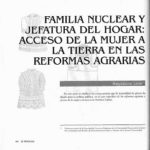CEDAW Fifth Periodic Reports of State Parties: Peru
Peru's fifth submission to the United Nations Committee that monitors the implementation of the Convention on the Elimination of All Forms of Discrimination Against Women (CEDAW) outlines the status of women in Peru. The government has faced difficulties changing attitudes that discriminate against women. However, mandatory changes in Peru's education system, including the introduction of the National Sex Education Programme, are highlighted as positive steps.






